‘I live in a peaceful corner of Bristol. But the house next door is empty and full of rats’
9 minutes agoNathan HeathBBC West Investigations

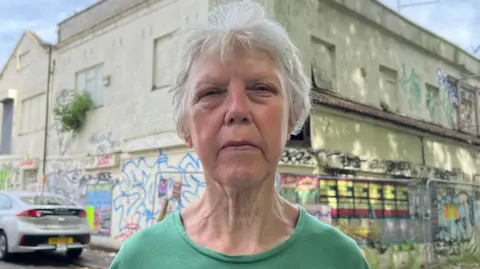 BBC
BBCAcross England, the number of empty homes has been steadily rising, with councils “increasingly concerned” about both the impact they have on local communities and the lost resource.
“It makes you feel afraid because you don’t know what’s going to happen next.”
Ann Devereaux has cherished her home in a peaceful corner of Bristol for more than 25 years. But the property next door – empty, collapsing and overrun with pests – has become a constant source of stress.
What was once just an eyesore is now a “magnet” for crime, she said.
“It’s a place just available and open for misuse,” she added.
“Whether it’s men coming out and urinating against the wall, drug-dealing or fly-tipping.
“It makes me feel scared when I leave my house or come in at night. It’s wearing me down emotionally.”
She has witnessed violence outside her front door, and the rotting smell of rubbish dumped inside the building sometimes drifts into her living room.

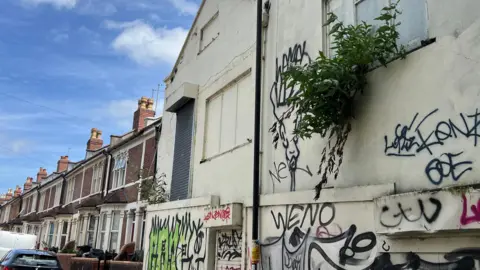
Bristol City Council said it has ordered the owner of the building to make it safe.
But Ms Devereaux and others in the tight-knit community of St Werburgh’s say the situation is “only getting worse”.
Just months ago, the roof of the derelict property collapsed, unleashing dozens of rats into nearby gardens.
“It’s a wasted resource, and I know there are a lot of places like this which are empty and rotting and creating real problems,” said Ms Devereaux.
The city council said it is “continuing to monitor the building” and will consider further action, including stepping in to carry out safety works, if the owner does not meet their obligations.

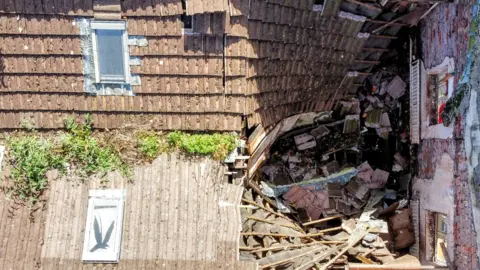
The BBC contacted the owner of the building, but had no response.
Residents of St Werburgh’s say they want the property brought back into use urgently – and their story is not unique.
The number of empty homes in England has risen over the last decade, even as the country grapples with a housing shortage.
There are now more than 700,000 empty homes, according to the most recent government figures. Of those, 264,884 are classed as “long-term empty”, meaning no one has lived there for six months or more.
In Wales, the figure stood at 120,000 empty properties the last time the data was collated.
In 2023 the Welsh Government launched a £50m National Empty Homes scheme, which offered up to £25,000 for improvements to be made to properties to make them available again.
Empty homes are also viewed as a missed opportunity by housing charities.
On one single night last autumn there were 4,667 people sleeping on the streets in England, according to official statistics – a near-record high and the third annual rise in a row.
Bristol charity, 1625 Independent People, is trying to change that.
Its Future Builders programme is transforming vacant properties into homes for young people facing homelessness to rent at a reduced cost.

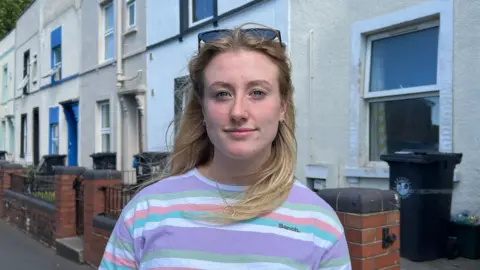
Becky Hopkins became homeless in the city at just 18 years old.
“I was completely lost, lonely, and isolated. I had feelings of self-hatred. I was worried all the time,” she said.
But the programme gave Ms Hopkins a more affordable place to rent while she worked towards a more stable future.
“After having a stable place, I really could focus on working on my mental health and building better habits.”
Now 21, she is training to become a Royal Navy engineer.
“It’s a transformation I didn’t think was possible,” she said.

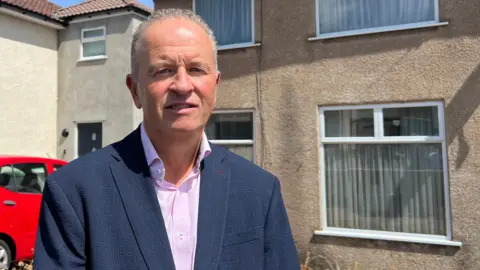
Local councils are on the frontline of the empty homes issue, and leaders are now calling for stronger powers and resources to bring more back into use.
Specific officers are tasked with tracing the owners of empty properties so they can be held accountable.
Sean Fudge leads the team at South Gloucestershire Council, which has brought 47 properties back into use so far this year.
“If left empty, they can lead to a spiral of decline, neglect and decay in a community,” he said.
“We initially try to engage with the owner, but when it becomes a detrimental impact to the wider neighbourhood, then we have to take enforcement action to stop that decline.”
Law change call
If the property has been empty for more than two years, and the owner is not cooperating, councils can apply for an Empty Dwelling Management Order (EDMO).
If granted, the council does not gain ownership of the property, but gets the right to manage and potentially improve it, recouping costs through rent.
But this power is rarely utilised because of the long and complex process involved.
In England, between 2017 and 2020, only 20 decisions were made on EDMO applications, according to government research.
The Local Government Association is calling for changes in the law to make it easier for councils to take over the management of vacant homes.

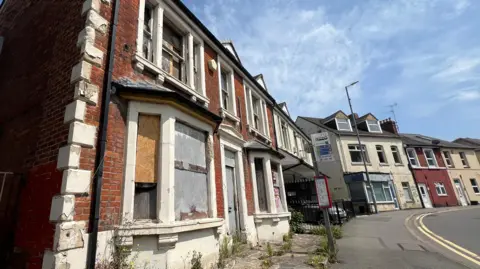
The group Action on Empty Homes is also campaigning to bring empty properties back into use.
Campaign manager Chris Bailey said: “Every empty home is a lost opportunity to improve the life of a family that’s currently homeless.
“These are homes which are relevant, in the right places – in the middle of towns and cities where people want to live – where services exist already.
“It’s not a case of building a whole new town and waiting for 10 years for it to happen, these are homes that are available now, they could be brought back into use within a year.”
But it is not always straightforward.

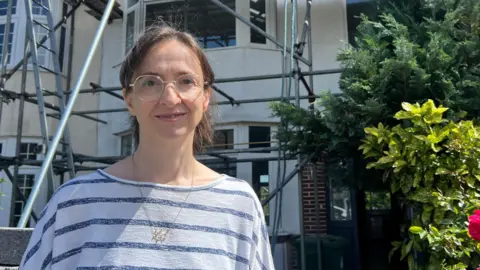
When homeowners die, their property often remains empty during the probate process, during which their assets are legally assessed and distributed.
Jenni Sadler inherited her mother’s house in 2011.
“It’s a huge privilege to inherit a home,” she said. “But it’s bittersweet when it’s such a close family member, because the home is them and they are the home.”
The property had fallen into disrepair, and Ms Sadler struggled to afford the mounting costs of essential renovations. As a result, the house has been empty while work is ongoing.
“We found more and more things that needed work,” she said.
“You find yourself thinking – how am I going to do this?”
Ms Sadler has secured a loan from Lendology which works with councils to offer low-interest loans to bring empty homes back into use.
She now hopes to complete the renovations and rent out the property through the Homes for Ukraine scheme.

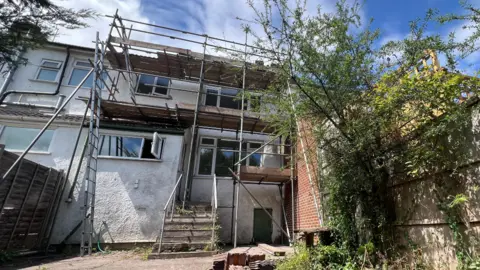
A spokesperson for the Ministry of Housing, Communities and Local Government said: “We are determined to fix the housing crisis we have inherited, and we know that having too many empty homes in an area can have a significant impact on local communities.
“That’s why we are giving councils stronger powers to increase council tax on long-term empty homes alongside removing tax incentives for short-term lets, and we continue to consider further action.”
If you want to contact us regarding this story, email westinvestigations@bbc.co.uk
Follow BBC West on Facebook, X and Instagram. Send your story ideas via WhatsApp on 0800 313 4630.
More on this storyRel